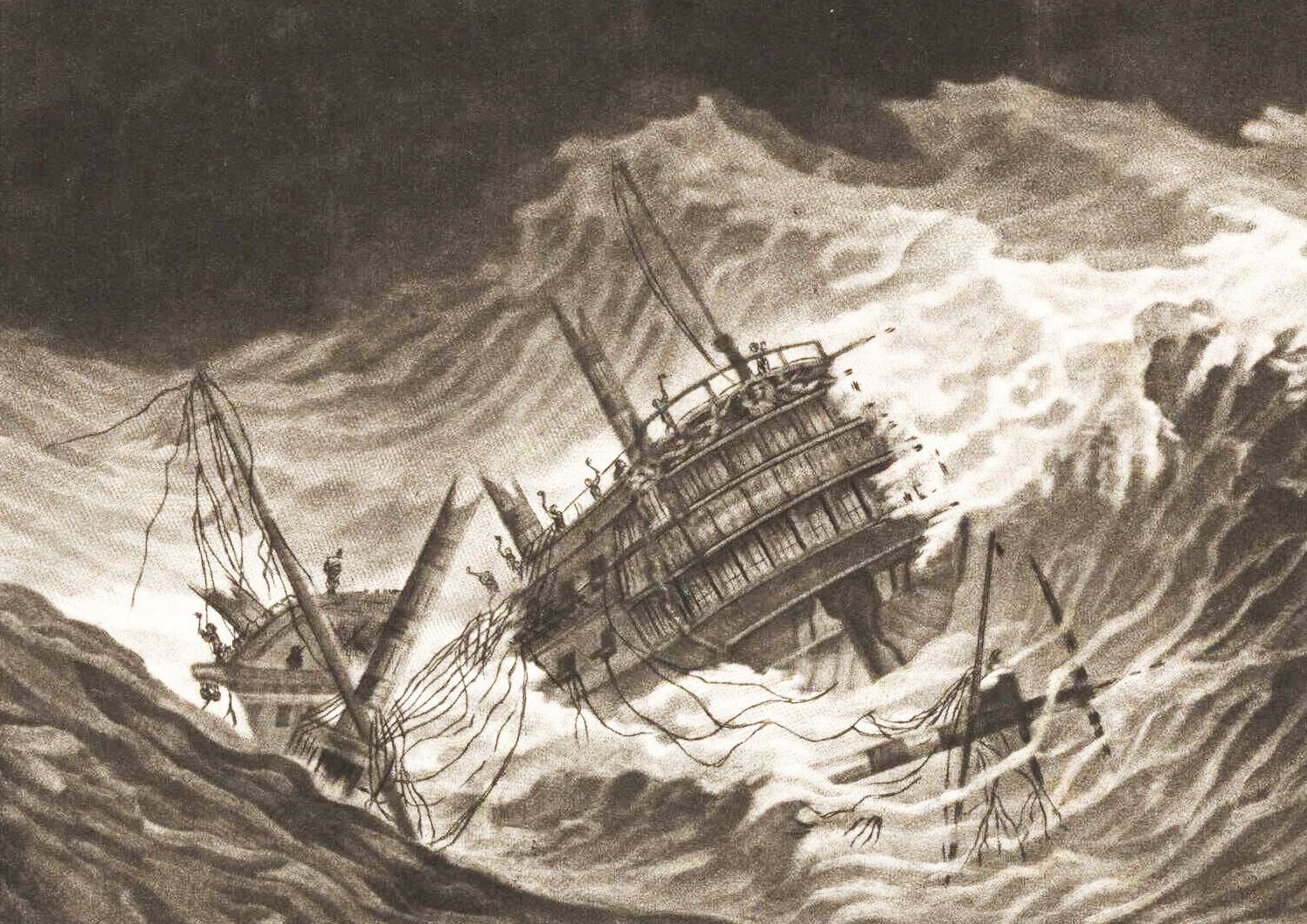Research by American Heritage reveals that the Royal Navy had 24 warships sunk or heavily damaged in October 1780, which must have affected Britain's ability to fight in the months before the surrender at Yorktown.
-
September 2020
Volume65Issue5

In doing research to support Eric Jay Dolin's important essay in this issue, "Did Hurricanes Save America?," we were not able to find any current histories of the period which provided an answer to that question.
We couldn't find a definitive list of British ships lost. In fact, all available lists of the losses in 1780 turned out to be incomplete, so we created one (see below).
The Royal Navy was stretched to the breaking point in the later years of the American Revolution. Few are aware that, at the same time as 13 of Britain's 17 colonies in North America were rebelling, the Crown was waging a worldwide war against the French, Spanish, and Dutch powers. The Royal Navy was called upon to defend the home islands in the English Channel and the North Sea, and to preserve territories of the empire in the Caribbean, India, and elsewhere.
The French blockade of General Cornwallis's army at Yorktown was crucial in the ultimate victory by the Americans and French. That blockade was made possible by the Comte de Grasse's victory in the Battle of the Chesapeake on September 5, 1781, in which the French held off a smaller British fleet trying to rescue Cornwallis' forces.
But surprisingly, historians have not asked a crucial question: Would the outcome of that crucial battle been different if the French had not outnumbered the British by 26 ships to 19? What if the British had not lost 15 warships a few months earlier in the hurricane season of 1780, the worst in recorded history?
To create a list of lost and seriously damaged British ships, we consulted the original records of losses with Lloyds of London, the British government's Annual Register published in 1781, which features details of naval actions of the previous year, and Ships of the Royal Navy, by J.J. Colledge and Ben Warlow.
15 Royal Navy Ships Lost in 1780 Hurricanes
| HMS Andromeda | The Enterprise-class frigate (28 guns) sank off Martinique with the loss of all of her crew. |
| HMS Barbadoes | 14 gun brig-sloop lost off Jamaica in the Savanna-la-Mar hurricane, October 3, 1780. [Colledge & Warlow, Ships of the Royal Navy.] |
| Beaver's Prize | The 18-gun ship (formerly a Pennsylvania privateer) was driven ashore and wrecked on Saint Lucia. All her crew except 17 perished. |
| HMS Chamelion | The Sloop-of-War was driven into HMS Deal Castle and sank in Gros Islet Bay, Saint Lucia. |
| HMS Deal Castle | The Squirrel-class post ship sank in Gros Islet Bay after HMS Chamelion was driven into her. |
| HMS Endeavor | 14 guns, built 1763, lost off Jamaica in the Savanna-la-Mar hurricane. [Listed The Register but not Lloyds] |
| HMS Endymion | The 44-gun ship was sunk off Martinique with the loss of all hands. |
| HMS Laurel | The 28-gun frigate was wrecked at Martinique with the loss of all but twelve of her crew. |
| HMS La Blanche | The fifth-rate ship (36-42 guns) was lost at Saint Lucia. [Lloyds] |
| HMS Monarch | Savanna-la-Mar Hurricane sunk the transport ship and killed entire crew and several hundred Spanish prisoners |
| HMS Phoenix | The 44-gun ship was lost on the coast of Cuba with five crew killed, Lt. Archer survived (not listed by Lloyds) 10-03 Savanna-la-Mar |
| HMS Scarborough | 22-gun sixth rate launched in 1756 that foundered in the Savanna-la-Mar hurricane. |
| HMS Sterling Castle | A 64-gun ship of the line wrecked off the coast of Hispaniola with the loss of nearly all her crew during the Savanna-la-Mar hurricane. [Register, not listed by Lloyds.] |
| HMS Thunderer | 74 guns, sank 90 miles east of Jamaica with the loss of all 617 on board including the Commodore Robert Boyle-Walsingham and Capt Cook's son. (not listed by Lloyds) 10-03 Savanna-la-Mar (Jamaica) |
| HMS Victor | 10 gun brig-sloop, purchased 1777 and lost off St. Lucia. |
British losses included the deaths of thousands of officers and crew, including Commodore Robert Boyle-Walsingham (right), a popular member of Parliament, who drowned with 670 others on the HMS Thunderer.
He had distinguished himself in the French & Indian War, and later in the House of Commons, where he warned that ''our present naval force was by no means adequate to the execution of our professed intentions.''
An Additional Nine Royal Navy Ships Badly Damaged in 1780 Hurricanes
In addition to the 15 Royal Navy ships sunk during the hurricanes, at least another nine were severely damaged. Five of these were large, two-deck ships of the line, or battleships, that would have required many months of repairs.
| HMS Ajax | The 74-gun ship of the line was driven ashore and "greatly damaged" at Saint Lucia. |
| HMS Amazon | The frigate was driven ashore and damaged at Saint Lucia with the loss of 30 lives. |
| HMS Berwick | Dismasted off Jamaica but limped to England with jury-rigged masts. |
| HMS Bristol | This 74-gun third rate ship of the line was dismasted and severely damaged. |
| HMS Brune | The Blonde-class frigate was damaged at Saint Lucia. |
| HMS Egmont | 74 gun ship of the line was dismasted off Jamaica and "in all other respects little better than a wreck, " according to The Annual Register, 1781. |
| HMS Hector | This 50-gun ship, which had been Sir Peter Parker's flagship during the attack on Charleston on 28 June 1776, was dismasted and severely damaged. |
| HMS Montague | This ship of the line was driven out to sea from St. Lucia and dismasted. |
| HMS Vengeance | This ship of the line was driven ashore and damaged at Saint Lucia. |

